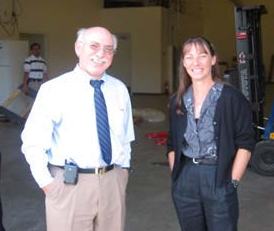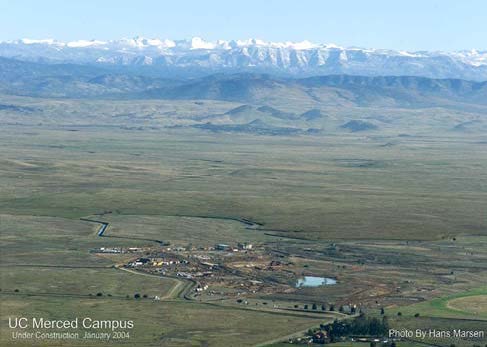February 2004
UC Merced Faculty Embark on Senate Work
 |
UCM Professors Henry Forman and Peggy O’Day in new laboratory space |
The start of a new UC campus also means the start of a new campus senate. The thirteen founding UC Merced faculty members, who began arriving at temporary quarters in town last summer, are now working full time not only to build the campus and establish their own research programs, but also to learn the ropes of shared governance and establish a new divisional senate.
The UC Merced Task Force, a special committee of the Academic Assembly that has acted pro tem as Merced’s divisional senate since 1999, is helping to transform this initial small band of faculty with no physical campus into a functioning Senate with a knowledge of shared governance and the independence to hire faculty, approve courses and curriculum, and respond to systemwide policy issues. UCM-CAP, another special committee of the Assembly, has been the body responsible for academic personnel decisions. With the Governor’s inclusion in his January budget of line item funding for Merced, the campus is on schedule to open for students in the fall of 2005.
Creating the Merced division will require the Task Force to formally transfer full senate responsibilities to UCM faculty. This process has begun with the Task Force establishing Merced’s first three senate committees: Undergraduate Council, Graduate Council, and a Committee on Planning and Resource Allocation. There is also a senate executive body — a small divisional council — that handles any systemwide issue that doesn’t fall under the charge of the other two committees.
Some may have the impression that without students, Merced faculty have a very light workload. But as founding faculty in a system of shared governance, Merced’s faculty are actually quite busy as they are often required to wear several hats. To start, since most of Merced’s founding faculty come to UC from other institutions, they have had to quickly learn about and now assume their responsibilities as senate members.
Chemistry Professor Anne Myers Kelley comes to Merced after being on the faculty of other institutions where she had no involvement in university governance. Straight off, she has taken on a variety of senate duties at UCM. As undergraduate Council Chair, Professor Kelley is working to set up an undergraduate curriculum, helping assemble a course catalog, formulating local academic senate regulations and writing divisional responses to systemwide policies and issues. She also sits on Merced’s Divisional Council, attends UCEP meetings as a divisional representative, and helps recruit and interview other faculty candidates. On top of this, she is setting up her lab in temporary space at Castle Air Force Base while remaining actively engaged in research with two postdocs. Finally, she is busy planning both her summer school course being offered in 2004, and Merced’s graduate program, which is planned for Fall 2004.
 |
“It’s sort of a double-edged sword,” said Professor Kelley. “On the one hand, you want and need the faculty to be involved in their own governance, but on the other hand, it means you have a lot more responsibilities. But I think it’s worth it. You’d rather have the freedom to make choices even though it means you have to do more work.”
In fall 2003, UC Merced began sending representatives to six systemwide senate committees, a practice that has afforded its new faculty both an opportunity to learn about shared governance and access to issues facing the university, many of which may have a deep impact on Merced. Officially, UCM faculty are currently attending meetings as nonvoting guests.
“It’s been a learning process for all of us,” said Natural Sciences Professor Henry Forman, who comes to Merced from the University of Alabama, Birmingham. “Getting up to speed will be essential. The Senate is the focal point for faculty decision-making directly affecting the development of the university.”
Professor Forman says that in one sense there is an advantage to not having to teach courses yet, because there is so much else to do. In addition to curriculum development and senate service. Forman continues to work as an editor of a journal, maintains progress on two NIH grants and fulfills various obligations for the CF Foundation, NIH, and other universities where he is a consultant. He is also involved in outreach. “So when people ask me what we are doing without students,” he said “my first response is to laugh.”
Merced faculty are eager to make the transition to an independent senate. However, many aspects of shared governance remain particularly challenging — for instance, the UC personnel system and issues of step and rank. Faculty members say they would welcome opportunities to observe divisional Senate business firsthand.
The Merced Task Force itself has been a unique challenge and opportunity for faculty from across the system to help build a new campus from the ground up. Over the past five years, the Task Force has made most of the foundational decisions, big and small, affecting campus development, advising on everything from administrative and faculty hires, majors, general education, fundraising priorities and energy efficiency in campus design.
Current UCM Task Force Chair Peter Berck (UCB) characterized involvement with the Task Force as “a very exciting assignment […] a once in a lifetime chance to make education available to all qualified California residents. “ He added, “No one will ever know its total impact.”
The Task Force will continue to gradually transfer authority and responsibility to Merced faculty. After the Task Force is eventually dissolved, many individual members will, however, continue to assist Merced faculty in an informal advisory capacity.
- Michael LaBriola
UC Merced Founding Faculty as of February 2004 |
|
| Roger Bales | Engineering |
| Michael Colvin | Engineering and Natural Sciences |
| Martha Conklin | Engineering |
| Henry Forman | Natural Sciences |
| Tom Harmon | Engineering |
| Gregg Herken | Social Sciences, Humanities and Arts |
| Anne Kelley | Natural Sciences |
| David Kelley | Natural Sciences |
| Valerie Leppert | Engineering |
| Peggy O'Day | Natural Sciences |
| William Shadish | Social Sciences, Humanities and Arts |
| Christopher Viney | Engineering |
| Roland Winston | Natural Sciences |
